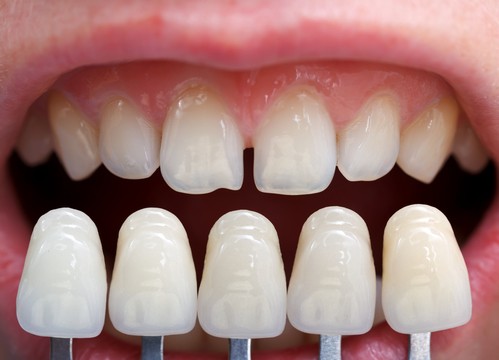If you’ve been considering the idea of getting dental veneers, one of the top questions you probably keep circling back around to is “Are veneers going to damage my natural teeth?”. Porcelain veneers are one of the most popular cosmetic dental treatments for today’s patients, and it’s easy to see why.
Regaining self confidence from the appearance of your smile is a life changing opportunity, and our patients have never felt more confident than they do after a smile makeover.
Take a look for yourself and see why so many patients are choosing to improve their smile with veneers.
How Veneers Impact Your Teeth
Veneers will not damage your natural teeth if your dental treatment plan is carried out by an experienced cosmetic dentist with relevant experience, and advanced training in the placement of veneers specifically. The most important thing to know about the safety of veneers is to always receive veneers from an experienced cosmetic dentist with past veneer cases.
Ask to see before and afters of other patients’ veneers to get an idea of their aesthetic skills. You should also ensure that your dentist has been providing cosmetic treatments for some time, and that they have the necessary credentials.
How Can Veneers Correct My Smile?
Veneers are used to correct teeth that are less than ideal due to any of these circumstances:
Discolored Teeth
Teeth that are severely discolored because of issues like root canal treatments, stains, excessive fluoride use during tooth development or other causes including large resin fillings that have left the tooth discolored.
Worn Down Teeth
Teeth that have been worn down due to grinding, erosion, tooth decay and other oral habits.
Chipped Teeth
Teeth that have several cracks, chipped, or broken teeth on any surface of the tooth.
Misaligned
Teeth that are misaligned, uneven, or irregularly shaped with craters or bulges in them.
Gaps
Teeth that have one or several gaps between them. Spaces between teeth create noticeable dark spaces that stand out in all the wrong ways.
How Much Of My Natural Tooth Is Drilled Away?
Short answer - not as much as you think! To prepare your teeth for veneers, your dentist will remove about ½ millimeter of enamel from the surface of your teeth to accommodate the thickness of the veneer that will be added to the tooth's surface. Once a patient has committed to veneers, there is no going back to your natural teeth because of the process of grinding down the enamel on your natural tooth to accommodate the veneer. Once you have veneers, you will need to continue to use them, or another form of dental restoration from that point forward.
How Long Do Veneers Last?
Just like your natural teeth, veneers need to be cared for and looked after but they’re much more durable than a natural tooth. With proper care, your veneers will last for years and sometimes even decades, only needing to be replaced if a problem develops, so how long your veneers last is really up to you!
The Pros and Cons of Veneers
Just like everything in life, choosing to move forward with veneers is going to have pros and cons, and those lists might be different for each patient depending on the situation. The factors that might help you to make a decision as to whether veneers are right for you or not are listed below.
The Pros of Veneers
The Cons of Veneers
Getting Started With Veneers
The first step towards getting veneers is to have a consultation with a licensed and reputable cosmetic dentist so your teeth can be assessed and together we can determine if veneers are a good option for you and your smile makeover. Dr. Okamura is a veneer expert with an excellent reputation.
Contact us today to schedule an appointment after taking our veneer quiz to see if veneers are the right option for you.

